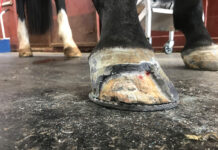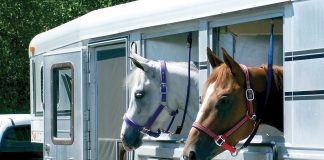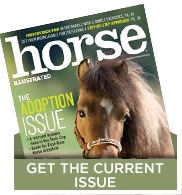As horse lovers, time isn’t the only thing we like to share with our animals. Who hasn’t raided her fridge for some spare carrots to share after a trail ride? Or what about those leftover peppermints from the holidays?
Fruit
Most fruit makes a great horse treat. Many are naturally sweet and require minimal—if any—preparation. Here is a basic list of horse-safe fruit to get you started:
- Apricots (without pit)
- Apples (without core)
- Berries (including strawberry, blueberry, blackberry, raspberry, loganberry)
- Banana
- Cantaloupe (without rind)
- Grapes
- Mango
- Orange and other citrus
- Peach
- Pear
- Pineapples
- Plums (and prunes)
- Watermelon
Yes, apple seeds do contain small amounts of a toxic chemical. However, the greater threat for horses that eat apple cores is choke. Apple slices are the safest way to offer apple treats to your horse.
Apricot pits are also toxic, and if ingested, produce clinical signs similar to those of cyanide poisoning. As with apples, don’t offer whole apricots to your horse—sliced or pitted apricots are the best way to go.
Vegetables
Vegetables aren’t quite as benevolent as fruits in terms of potential horse treats. Carrots are great, as are squash of all types, celery, and green beans, but there are a few families of related veggies that shouldn’t be given to horses. For example, members of the Brassica family, which includes broccoli, cabbage, cauliflower, kale, and Brussels sprouts, should not be given to horses. Lettuce, however, is horse-safe.
Tomatoes are an interesting option. Tomato plants are toxic to horses; they are in fact members of the nightshade family. However, the tomato fruit itself is not toxic. Horse owners should be advised not to throw old tomato plants from the garden into horse pasture as an unintentionally toxic treat.
Garlic and onions are other vegetables that are toxic to horses and shouldn’t be offered as treats, although you may find garlic in certain equine supplements. Like other natural or herbal supplements, garlic supplements have not been evaluated by the FDA for safety or effectiveness so their toxic doses are unknown. Garlic is known to cause gastric ulcers, prolonged bleeding, and anemia in horses when given at high doses for extended periods but toxic signs resolve after the garlic is removed. Do not give your horse raw garlic. If you are interested in giving your horse a powdered garlic supplement, consult the container for dosage information and talk with your veterinarian.
Avocado, too, is another plant that’s best to stay away from; the avocado itself isn’t toxic, but its skin, pit, and leaves from the plant are poisonous.
Cooked versus raw vegetables also make a difference. Cooked potatoes are okay for horses on a limited basis, but raw potatoes should never be given to horses.
Sweets and Processed Treats
While the occasional nibble of bread is okay for most horses, certain ingredients in baked goods and other prepared foods can be toxic. Take, for example, chocolate. Just like dogs, horses are sensitive to the chemical theobromine in chocolate and therefore large amounts of chocolate are toxic to horses.
While an occasional stolen Snickers isn’t enough to be a problem, there are cases where unintentional exposure to large amounts of cocoa are lethal to horses. Some reports of chocolate toxicity in horses are reported after animals were bedded in stalls with cocoa husks, a by-product of cocoa farming.
Caffeine can also be toxic to horses in large quantities. Similar to chocolate, cases of caffeine toxicity in horses have resulted after horses were bedded with the husks from coffee plants. Examples such as these provide another glimpse into ways horses can inadvertently be poisoned from good intentions. This can act as a helpful reminder to horse owners to be vigilant: “treats” from well-meaning but uninformed neighbors, such as yard and garden clippings, items pulled from the compost bin, or extras from the local bakery should not be given to horses for consumption or used as bedding.
Special Considerations
For certain horses, even non-toxic treats can have a negative affect on health. Horses that are obese, prone to founder, and those who suffer from insulin resistance need to have their diets tightly restricted in terms of sugar and starch intake. For this reason, most fruits are off-limits to these horses. Even the trusty horse-safe stand-bys such as apples and carrots are too sugary. However, apple peels make a great treat for horses with metabolic issues. Banana peels work, too. This way, your horse is getting a sweet treat without the bulk of the sugar, plus some dietary fiber.
For horses with HYPP, stay away from foods containing high levels of potassium. Bananas are a definite no-no for these horses due to their relatively high potassium content, as are apricots and plums, particularly in their dried form as prunes. Another unsuspecting culprit is pumpkin. A great festive snack after Halloween, pumpkin is high in vitamins and has a low glycemic index, so it’s safe for our insulin-resistant horses but it does have a large amount of potassium, making it a no-go for those with HYPP.
Senior horses are another group to give careful consideration to when deciding on treats. With poor dentition, older horses are at higher risk for choke. Hard crunchy snacks should be broken into small pieces for easier chewing, or soaked in water to soften. Pits and large seeds should be removed as well as any thick or tough rinds that may require strategic nibbling. Applesauce is a great treat for older horses—all the sweetness of an apple without the hassle of chewing!
We love our horses and love sharing our lives with them. Sharing treats with our equine companions is just another part of the fun. Knowing what you can safely feed your horse will make sharing that much more enjoyable.
Liked this article? Here are others you’ll love:
Pumpkin Treats for Horses
An Apple a Day







Great article!!
I have fed my horses whole apples for last 20years with no problem whatsoever as have many other people I know??????
I have been giving my horses salted peanuts in the shell! Safe treat for horses with metabolic issues and they are a cheap treat, a big bag for $5.00 goes a long way and they love them.
Garlic is NOT toxic for horse there are tons of garlic supplements on the market we feed all of the horses at my barn garlic it’s great for fly control, good for joints and boosts the immune system, however cherry pits and leaves ARE toxic for horses.
Don’t a lot of people use Garlic to repel flies? Garlic is toxic? Just curious as to where that came from. I know a lady at my barn whose daily feed has garlic in it.
According to my Veterinarian and several on-line searches I have done; garlic is toxic. It IS in a lot of supplements to repel flies but feeding these supplements is a risk. I choose to avoid anything with garlic – no matter what the claims on the labeling.
Garlic used in supplements has been cooked and dried and as such the oil content is very low and is considered non toxic to horses. A horse would have to eat ALOT of fresh raw garlic to have an issue and most would be gas and colic issues
why not feed raw potatoes to horses… my grandfather taught me that it was a good wormer for horses during the early 20’s and 30’s. My horses love them and I feed them regularly. What is it about the potatoe that is bad for them?
we feed our horses sweet potatoes-are there any drawbacks to them? we also feed them corn stalks after we are done with them and they love them
And then there are my horses which eat anything and everything except meat! One pony was the ultimate recycler we gave him tomatoes and got plants in the manure pile. Current pony will eat anything don’t bother peeling it lemons limes bananas etc! We have a deck overlooking paddock our horses have learned to look up for treats not down!!
My mule loves peppermints. You did not address this, are they ok? And thank you for the information about the apple cores! I have always cored them for our horses and people said I was too cautious.
I have used peanuts in the shell and black oil sunflower seeds….
I don’t feed hedge apples to my horses but they seem to be very attracted to them. I have tried to find if they are toxic to horses but have never found an answer. Could you tell me if they are toxic, best not left to eat or ok?
Interesting declarations. However, where’re the backup references that make these statements true? What is wrong with the braccia family of vegetables? What makes them toxic to horses?
There’s simply not enough information included in this article to make it credible. Please provide.
Further to the comment about apples seeds and arsenic, please read:
http://www.newton.dep.anl.gov/askasci/bot00/bot00208.htm
It states a bushel of seeds eaten all at once to be toxic (and it’s cyanide, not arsenic).
My spoiled brats like steak and lobster 🙁
Have have seen people feed horses raw sweet potatoes without an adverse outcome. I have not practice this so is this safe?
Garlic is a natural antibiotic. What study says it’s bad? I’d like to see the proof.
Garlic has been scientifically proved to be TOXIC for our precious horses. It’s known to cause anemia (a very common knowledge here in Norway, at least the past 5 years)
If garlic is toxic does that mean we shouldn’t be feeding the powdered or granulated stuff that you get from the feed store?
Great article, but I’m confused about garlic. Many people feed garlic for breathing and well being? It certainly not toxic.
http://www.equisearch.com/article/eqgarlic528
Very informative and I was quite surprised with what you can and should not feed your horse. I have re posted onto my Facebook page for my friends who also have horses
Thank you for publishing this artical. I certainly learned something new today.
My horse has been fed a scoop of garlic every day in his grain in the summer for 17 years. It is a great way to keep the flies away. He is the picture of health. I would question your choice of garlic being toxic.
Here is an article on garlic and its toxicity issues in animals:
http://www.equisearch.com/article/eqgarlic528
I had no idea garlic was toxic! I knew that it was poisonous to dogs, but I figured it couldn’t be toxic to horses, since it is in so many fly-control supplements. Buyer beware, I guess! I’ve tried offering my horse bananas, but he won’t eat them.
I used to give my horse and mini donkey an Apple everyday, but have now switched to a carrot. They stand and,look at my pocket and nudge my hand because they know there is a carrot with their names on it. I break the carrot in chunks so They don’t choke.
Hey Ellen, try freezing your bananas, peel and all!
my baby loves them cut into quarters for an icy cold treat on hot days!
Great information! What about raw sweet potatoes? I was told once by an equine nutritionist that they were good for a horses digestive system because they were high in fiber which balances out the sugar content. Now I have other people tell me I shouldn’t give raw sweet potatoes?
http://www.rideaway.co.uk/naf-garlic-granules?var=139740&_$ja=cgid:14059495465|tsid:59260|cid:205661305|lid:81491313865|nw:g|crid:59691894745|rnd:151007
why is this safe to feed then ??
I edit a newsletter for an equestrian group. Is it OK to re-print the article, giving you credit of course? Please let me know. You can email me at merkaufman@me.com. Thanks
Why shoud a apple peel be good? My horse has leved insuline and is supect to PSSM 2 and one peel gives him a ty-up, same as with a bit of joung gras from the side, just do not feed horses
I thought cabbage was safe for horses, especially for easing symptoms of hind gut ulcers. Can you explain why you say they are toxic?
I have always fed garlic to my horses which I buy from feed suppliers as a supplement. It is good for horses in lots of ways.
Very misleading article
Apple pips do contain a toxin – amygdalin which can covert to cyanide ( not arsenic as stated ) in some circumstances. It would take several kilograms of freshly ground pips to affect a horse but an apple would only carry about a gram. As a rule the seed coat passes through the gut unruptured. They are too tough and small to be ground up by horse molars.
Greens generally produce too much gas in horses so not good as a staple diet but can be more beneficial than too many high sugar carrots and apples for all sorts of reason. And garlic ( and onions ) ! Yes it does contain N-propyl disulphide which can cause anaemia but being a natural sulphur source and derivative of msm there are huge benefits from cautious use.
All mammals are exposed to toxins in food and have good detox systems as a defence – that’s how we all feed, by filtering out components that can harm. Common sense and caution have to be used to avoid trouble and reap the benefits.
I think it is a good article but people need to remember to give these in moderation. Carrots, for example has a lot o sugar. Plus celery is not a good idea as it gets stringy and horses can choke
This is good to know!
Granola bars with no chocolate?Quakers oatmeal?
I give my horses these and they love them:
https://www.corkfarmequestrian.co.uk/products/leovet-leoveties-horse-pony-treats-nutritious-healthy-apple-carrot-orange-1kg